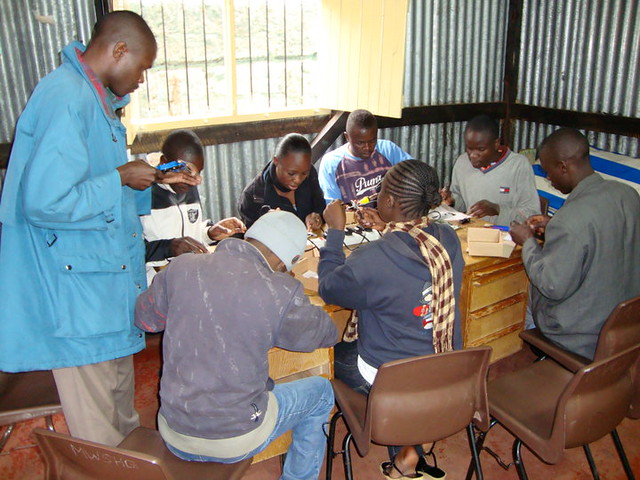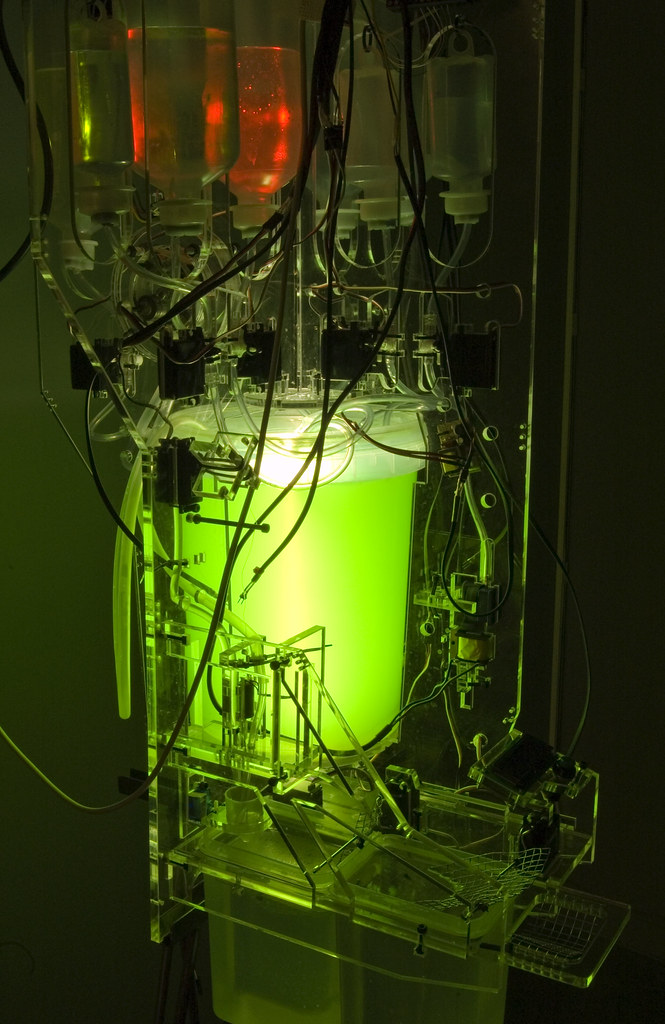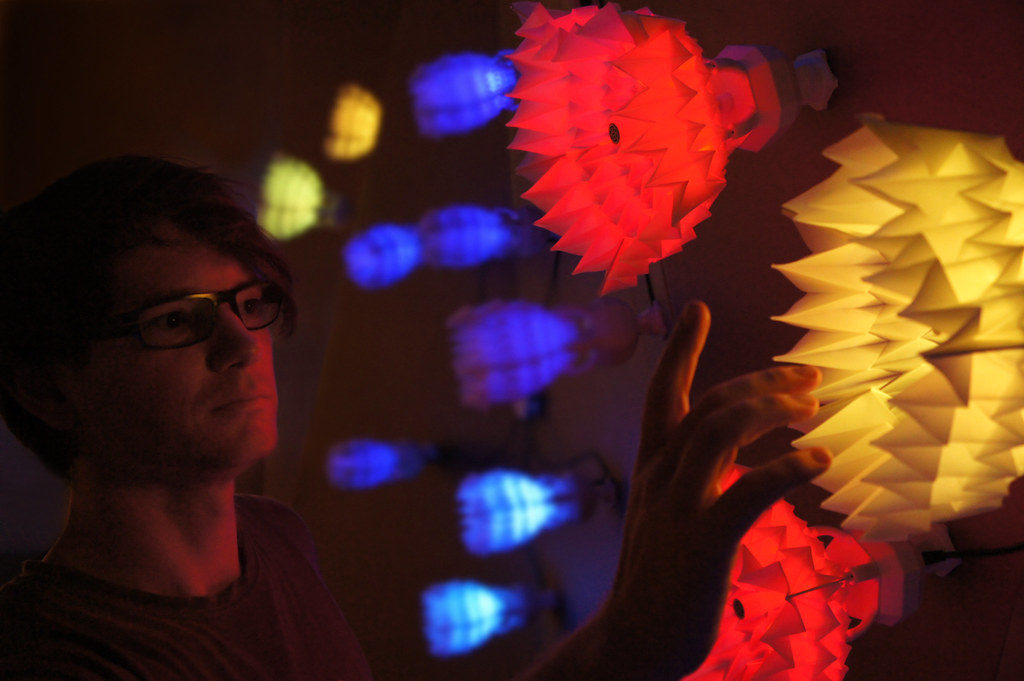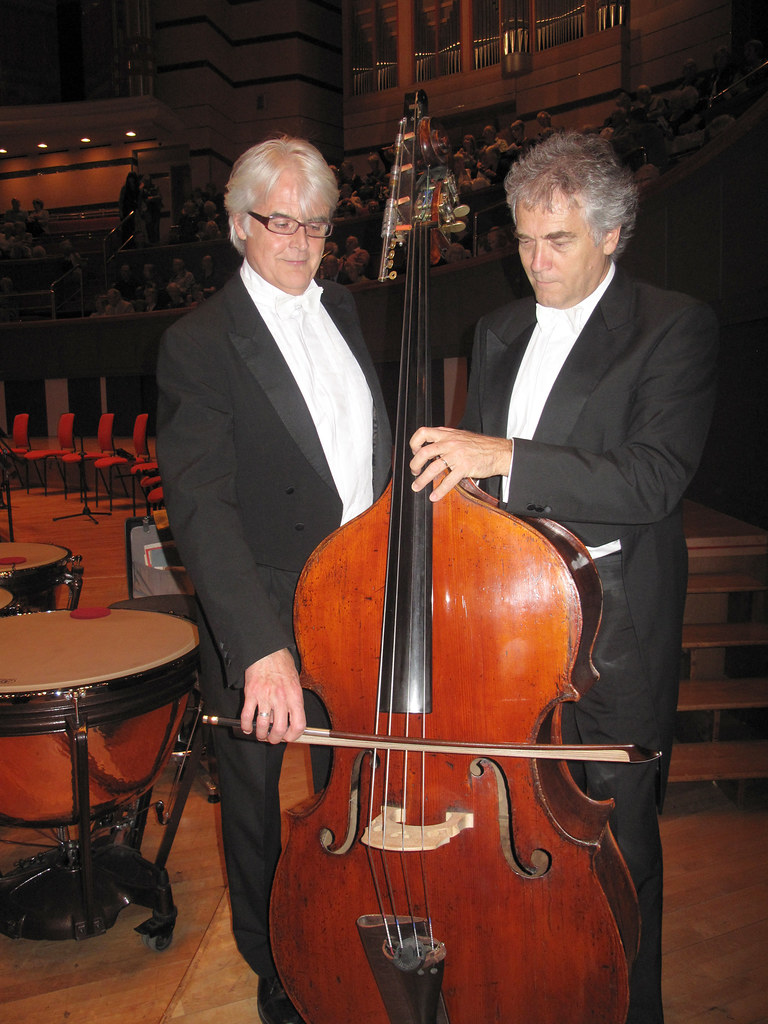Pixelspaces 2011, Rescripting
Pixelspaces is an annual series of conferences that the Ars Electronica Futurelab has been hosting since 2001. Attendees take up current issues at the nexus of art, science and society, and discuss them from the perspective of an atelier-laboratory.
/////////////////////////////////////////////////////////////////////////////////////////////////////////////////////////////////////////////////
The series’ thematic spectrum has undergone steady expansion from its initial focus on computer gaming, architecture and virtual/augmented reality to its present orientation on the R&D work currently in progress at the Ars Electronica Futurelab. *Pixelspaces* has thus established itself as the dynamic hub of a community of artists and scientists that enables conference participants to present their work and to discuss socially relevant issues associated with it.
Pixelspaces 2011: Re-Scripting
Inspired by the term “script” that sociologist of technology Madeleine Akrich uses to refer to those elements of an electronic device that a priori prescribe users’ options for action and thereby structure them, the term “re-scripting” is meant to refer to changing social circumstances and to bring up the question of new patterns and interrelationships.
Panel 1: [the next idea] in research

Kibilight Project, credit: Kibilight Project

Haberlandt / blablabLAB, credit: blablabLAB
10:00 Horst Hörtner (Laboratory Director, Ars Electronica Futurelab / AT): Pixelspaces Welcome Address
10:30 Bernhard Böhm (Ars Electronica Futurelab / AT): Introduction
10:40 Gerard Rubio (Artist, blablabLAB / ES), Raul Nieves (Artist, Haberlandt / ES)
11:00 Elizabeth Otieno (Project Manager, Kibilight Project / KE)
11:20 James Burke (Information Architect, Experience Designer, P2P Foundation / NL/UK)
11:40 Roundup and Discussion
The objective of this panel is to shed some light on the new interrelationship
among science, technology and society from practitioners’ perspectives and
to go through a process of reflection about the present and future opportunities
and risks associated with this development. In the first panel, we’ll
showcase outstanding projects that were singled out for recognition in [the
next idea] voestalpine Art and Technology Grant competition at this year’s
Prix Ars Electronica. They have to do with energy, mobility and access, issues
of enormous importance to humankind’s future.
Panel 2: Open Research!

Oribotics / Matthew Gardiner (AU), credit: Matthew Gardiner
13:30 Bernhard Böhm (AT), Roland Reiter (Ars Electronica Futurelab / AT): Introduction
13:40 Matthew Gardiner (Artist and Researcher, Ars Electronica Futurelab / AU)
14:00 Boris Debackere (NL/Manager, V2_Lab)
14:20 Joao Pequenao (POR/Research Specialist, CERN)
14:40 Ulrike Felt (Professor of Science Studies, University of Vienna / AT)
15:00 Roundup and Discussion
Panelists will consider the research paradigm shift going on right now from the point of view of artists and researchers working in an institutional context. The focus will be on the new link-up of scientific systems and previously excluded segments of society.
The time has come to set up new shared spaces that enable science and art to come out and “play.” Spaces in which each can observe the way the other works, in which each can learn from the other, and can do some collaborative tinkering on innovations for the society of the future. In addition to this paradigm of interdisciplinarity, Day 2 of the Pixelspaces Symposium will deal with another current trend: the expansion of the concept of research in the direction of gaining artistic insights.
Artists are increasingly emancipating themselves and assuming the role of independent researcher. The increasing attention this is garnering will be illustrated during the panel with reference to new subsidy programs and artistic research projects. Which all goes to show that: Art Makes Science.
Panel 3: Creative Collisions
10:00 Christopher Lindinger (Director of Research and Innovations, Ars Electronica Futurelab / AT): Introduction
10:20 Ariane Koek (International Arts Development, Collide@CERN/ CERN / UK)
10:40 Lynn Scarff (Education and Outreach Manager, Science Gallery Dublin / IR)
11:00 Marcos Garcia (Head of Program, Media Lab Prado / ES)
11:20 David Edwards (Director Le Laboratoir Paris/ Professor, Harvard University / US)
11:40 Roundup and Discussion
What happens when media artists and scientists get together to inspire one another or even to collaborate? Panel 3 scrutinizes the potential of interdisciplinary link-ups. At the center of attention will be innovative art & science collaborations including the European platform StudioLab as well as the planned artist-in-residence program at the CERN research center in Switzerland that’s currently being planned in cooperation with the Ars Electronica Futurelab.
Panel 4: Re-Scripting the Stage
13:30 Roland Haring (Senior Research Lead – Interaction Ecologies, Ars Electronica Futurelab / AT): Introduction
13:40 Martina Mara (Researcher, Ars Electronica Futurelab / AT)
14:00 Klaus Obermaier (Media artist and “(St)Age of Participation” project leader / AT)
14:20 Louis-Philippe Demers (CA/SG) (Artist, Designer and Researcher, Associate Professor at Nanyang Technological University)
14:40 Johannes Birringer (US/UK) (Artist, Choreographer and Author, Professor at Brunel University London)
15:00 Roundup and Discussion
“St(Age) of Participation” is an artistic research project that the Ars Electronica Futurelab has launched in 2011 together with media artist and choreographer Klaus Obermaier (AT) to test new participative, multimedia forms of stage-based performance. In addition to presenting the project and its objectives, the panelist will be discussing the concepts of the theatrical stage and the dramatic performance, and what the future might bring in this context.
Panel 5: OHMI – The One-Handed Musical Instrument Project

OHMI, One Handed Music Instrument, credit: OHMI
16:00 Horst Hörtner (Laboratory Director, Ars Electronica Futurelab / AT): Introduction
16:10 Stephen Hetherington (Founder of the OHMI Project / UK)
16:30 Joe Paradiso (Director of the Responsive Environments, MIT MediaLab / US)
16:50 Peter Purgathofer (Associate Professor Vienna University of Technology / AT)
17:10 Nick Wilsdon (UK/Assistive Music Technology specialist at Drake Music; Sound Designer; Media Artist & Musician)
17:30 Roundup and Discussion – Moderation: Horst Hörtner (Laboratory Director, Ars Electronica Futurelab / AT)
There is presently no orchestral musical instrument that can be played with one hand. As a result millions of people across the world with impairment in one hand or arm are excluded from music making. We want to invent new instruments to open full and undifferentiated participation in musical life; whether at school, in the home, or in a professional ensemble. The technical difficulties of this challenge are considerable. It is now fairly straightforward to synthesize the sounds of orchestral instruments electronically, but this is a far cry from the subtlety and complexity of performance on a realorchestral wind or string instrument. The OHMI Project is trying to create musical equivalence, compatibility and the possibility of participation. Our success will have a profound impact not just on individuals, but also on society‘s relationship with disability, opening new realms of achievement and possibility.
The Ars Electronica OHMI Competition
The OHMI-Trust was formed by Stephen Hetherington and Martin Dyke in 2011 in response to Stephen’s attempts to find a musical instrument his hemiplegic daughter could play at school. Panel 5 on the One-Handed Musical Instrument Project in conjunction with Pixelspaces 2011 will officially launch the Ars Electronica OHMI Competition. The competition will then commence and the entry rules will be formally published. It is expected that each round of the competition will last two years. At the end of the first year the best concepts and prototypes will be awarded funds to assist further development.
Actual performances will then be given on the new instruments at the end of the second year. It is planned that the winning instrument will get a special Prix Ars Electronica award and will perform as part of the Ars Electronica Festival before playing again with the City of Birmingham Orchestra in the UK.






[…] Die Pixelspaces des Futurelab feierten 2001 ihre Premiere, und wurden gleich zum durchschlagenden Erfolg. Der Austausch an Wissen, die Diskussion bringt die hellsten Köpfe aus der Schnittmenge von Kunst und Technologie nach Linz, und auch 2011 wird da keine Ausnahme darstellen. Konkrete Informationen zu der diesjährigen Ausgaben finden sie hier. […]